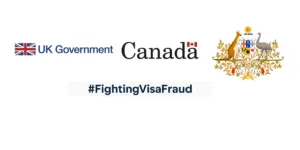The UK, Australia and Canada, have unveiled a joint international campaign to combat visa fraud and protect people from exploitation by fraudulent immigration facilitators.
A statement issued by the British High Commission in Abuja, said the initiative, which is tagged: #FightingVisaFraud campaign, was unveiled during the International Fraud Awareness Week.
It explained that the campaign aimed to raise awareness of the serious consequences of visa fraud, noting that they had identified common patterns of visa fraud affecting their immigration systems.
According to the statement, the visa fraud costs victims millions of pounds annually and puts vulnerable people at risk of exploitation, financial ruin and legal consequences.
It warned that culprits risked serious consequences, including 10 years travel bans, visa application refusal, financial loss with no recourse, criminal charges in some jurisdictions, exploitation and trafficking risks.
“The United Kingdom, Canada and Australia share strong historical ties, common values and close cooperation on immigration and security matters.
“Visa fraud and illegal immigration facilitation have reached alarming levels globally, with criminal networks using increasingly sophisticated tactics to deceive prospective visa applicants.
“Victims are often promised guaranteed visas, jobs without proper qualifications, or expedited processing in exchange for exorbitant fees,” the statement said.
It added that their coordinated campaign was a demonstration of the three countries’ commitment to protecting legitimate visa applicants, while maintaining the integrity of their immigration systems and secure borders.
“Visa fraud destroys dreams and devastates families. Criminal facilitators prey on people’s legitimate aspirations for a better life, stealing their money and putting them at risk of serious harm.
“Through this joint campaign with our international partners, we are sending a clear message: use only official channels, verify all advice, and report suspicious activity.
“The UK welcomes legitimate visa applications through proper routes – but those who attempt fraud face serious consequences, including 10-year travel bans,” Dr Richard Montgomery, British High Commissioner to Nigeria, was quoted as saying.
Canadian High Commissioner to Nigeria, Mr Pasquale Salvaggio, added: “Canada is committed to working with our international partners to combat visa fraud and protect people from exploitation.
“This campaign reflects our shared values and determination to maintain fair, secure immigration systems, while supporting those who seek to travel, study or work through legitimate pathways.”
The three countries, therefore, urged prospective visa applicants to use only official government websites for visa information and applications, and also verify that immigration advisers are properly registered and regulated.
They also warned them to beware of demands for excessive fees, pressure to pay quickly, promises of jobs without proper qualifications, offers to bypass standard requirements; and report such suspicious activities to relevant authorities.
The three countries said their immigration authorities work closely with law enforcement agencies to investigate and prosecute visa fraud and illegal facilitation.
The statement directed prospective visa applicants to find legitimate information on the countries’ visa as follows:
United Kingdom: www.gov.uk/browse/visas-immigration
Canada: Immigration, Refugees and Citizenship Canada – Canada.ca
If you suspect visa fraud or have been a victim:
United Kingdom • Report online: https://www.actionfraud.police.uk/
Action Fraud provides a fraud-reporting and advice centre for people and small businesses.
For detailed guidance on avoiding scams, visit:http://www.gov.uk/government/publications/frauds-tricks-and-scams
“This is a coordinated campaign with each country managing its own implementation and communications in line with national contexts and priorities.
“Campaign materials, including warning signs of visa fraud and guidance for applicants, are available on our social media accounts.
“For country-specific information about immigration requirements and processes, please refer to official government websites listed above,” the statement added.














